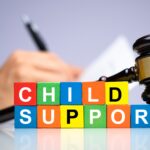ATTENTION DEFICIT DISORDER with HYPERACTIVITY and It’s Effect on Family Separation
All too often we read or hear about difficult or explosive children at school, at home or with their friends. We also read about dysfunctional family separations. What role does ADHD play in family dynamics?
Attention Deficit Disorder with Hyperactivity or ADHD is most common in school-aged boys, however, some girls and some adults may continue to struggle with ADHD. There are three main ADHD characteristics: inattentiveness, impulsivity and hyperactivity, associated with low self-esteem. Active young boys often seek attention from male teachers and coaches who frequently are their only male role models. Typically, very few male teachers teach primary school grades leaving agitated boys with an over-abundance of female influence. In sports, ADHD children with inattentiveness may have unique focusing abilities. ADHD boys are often goalies in hockey and soccer requiring short-term concentration (hyper-focusing), leading quickly to a wandering mind (hypo-focusing). Musically inclined boys seek comfort in drumming. The repetitive tapping or banging, and its requirement to stay on task, acts as a calming exercise while improving concentration, hand-eye coordination and reduces energy levels and anxiety. Goalies are often quite musically oriented. Girls often daydream and lack hyperactivity associated with boys, but also lack the concentration required while at school.
As ADHD boys and girls mature they begin to avoid areas of life where they lack confidence and self-esteem. However, they do develop an improved ability to concentrate and stay focused. Impulsivity tends to influence their short and long-term decision-making processes, which affects friendships, how they behave at school, their organizational abilities and their capacity to manage irritability and moodiness. Generally, their ability to cope with problems without exploding verbally or physically is frequently at risk.
Hyperactivity often calms during teenage years. Common to many children with ADHD are attributes of anxiety, hypersensitivity and extreme opposition. In adults, many ADHD triggers persist from childhood. Adults with ADHD may function at very high levels of performance while being dysfunctional in other areas of life where self-esteem is lacking. It is common for adults to exhibit anxiety, depression, manic episodes, extreme opposition, abusive behavior or total withdrawal in order to ease their individual pain and negative thoughts. Marital relationships often continue in this adversarial manner. Adults often experience restlessness, excitability, aggressive speech and actions exhibiting excessive control over their partner and family members.
Family Lawyers / Attorneys and other trained Professionals help separating partners draft Parenting Plans as part of Separation / Divorce Agreements and advise struggling parents how to deal with specific personal issues. Family problems, which co-exist with ADHD, Depression or Bipolar Disorder, require Parenting Plans geared to the individual dynamics of that particular family. Marital breakdown increases when ADHD children push their parents beyond their individual comfort and breaking point. ADHD children usually have one or more parents with similar behavioral characteristics. Often these parents cannot cope with family pressures and begin to assume controlling behavior, become frustrated and abusive, or withdraw completely from the marital relationship. Ongoing disputes occur between separating parents, either emotionally and / or financially. In these situations, childrens’ requirements need professional evaluation to reduce tension and ongoing anxiety.
If you, your ex-partner or your children struggle with ADHD or other emotional problems, look for a professional with experience to help you draft an appropriate Parenting Plan / Parenting Schedule and get help with your Financial Budget. Couples or individuals experiencing family emotional disorders often require Parenting Plans specifically listing each parent’s responsibilities, with specific detail. Being knowledgeable, organized and understanding what is best for your children is always the best place to start.
When Children Do Well, Parents Do Well
When Parents Do Well, Children Do Well
























